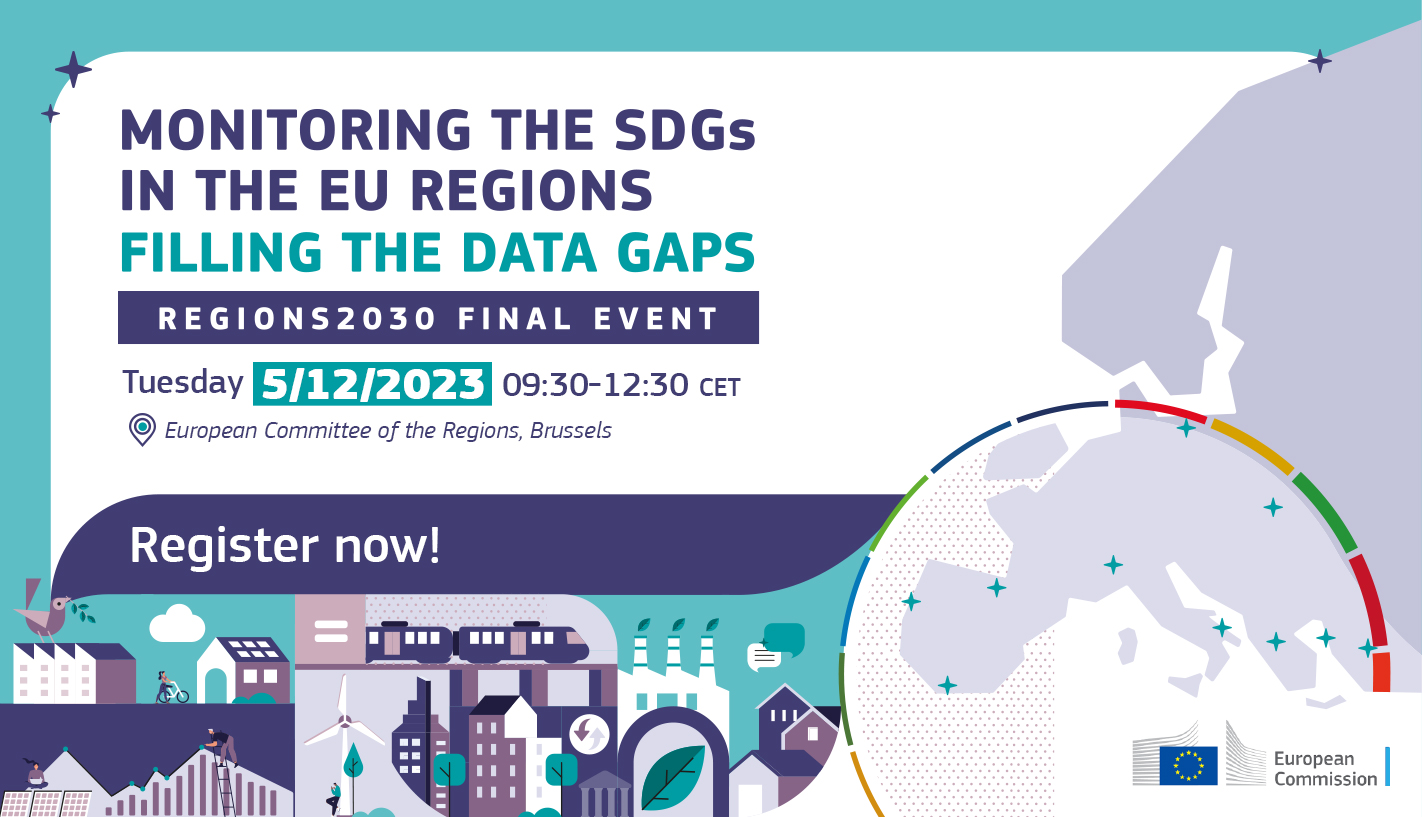
Monitoring SDGs in EU regions: Filling the data gaps
Local actions and strategies are essential to implementing the United Nations’ Sustainable Development Agenda. On 5 December, the final event of the pilot project “REGIONS2030: Monitoring the SDGs in the EU regions - Filling the data gaps” will take place, with 10 European regions presenting a shared system to monitor the Sustainable Development Goals regionally.
Participants will leave with an enhanced understanding of the role of regional indicators in monitoring progress towards the SDGs, as well as strategies for their implementation and the importance of regional cooperation in achieving sustainable development in Europe.
The pilot project “REGIONS2030: Monitoring the SDGs in the EU regions - Filling the data gaps” is a collaboration between the European Parliament, the European Commission (Joint Research Centre, DG REGIO, EUROSTAT) and 10 European pilot regions. The project aims to co-design and test a common set of indicators to monitor all SDGs regionally in Europe.
Please find more information and registration here.
- 05/12/2023 - 09:30 - 05/12/2023 - 12:30
-
European Committee of the Regions
Batiment Jacques Delors, Rue Belliard 99/101
1040 Brussels
Belgium - Francesca Pozzebon
-
Working Group
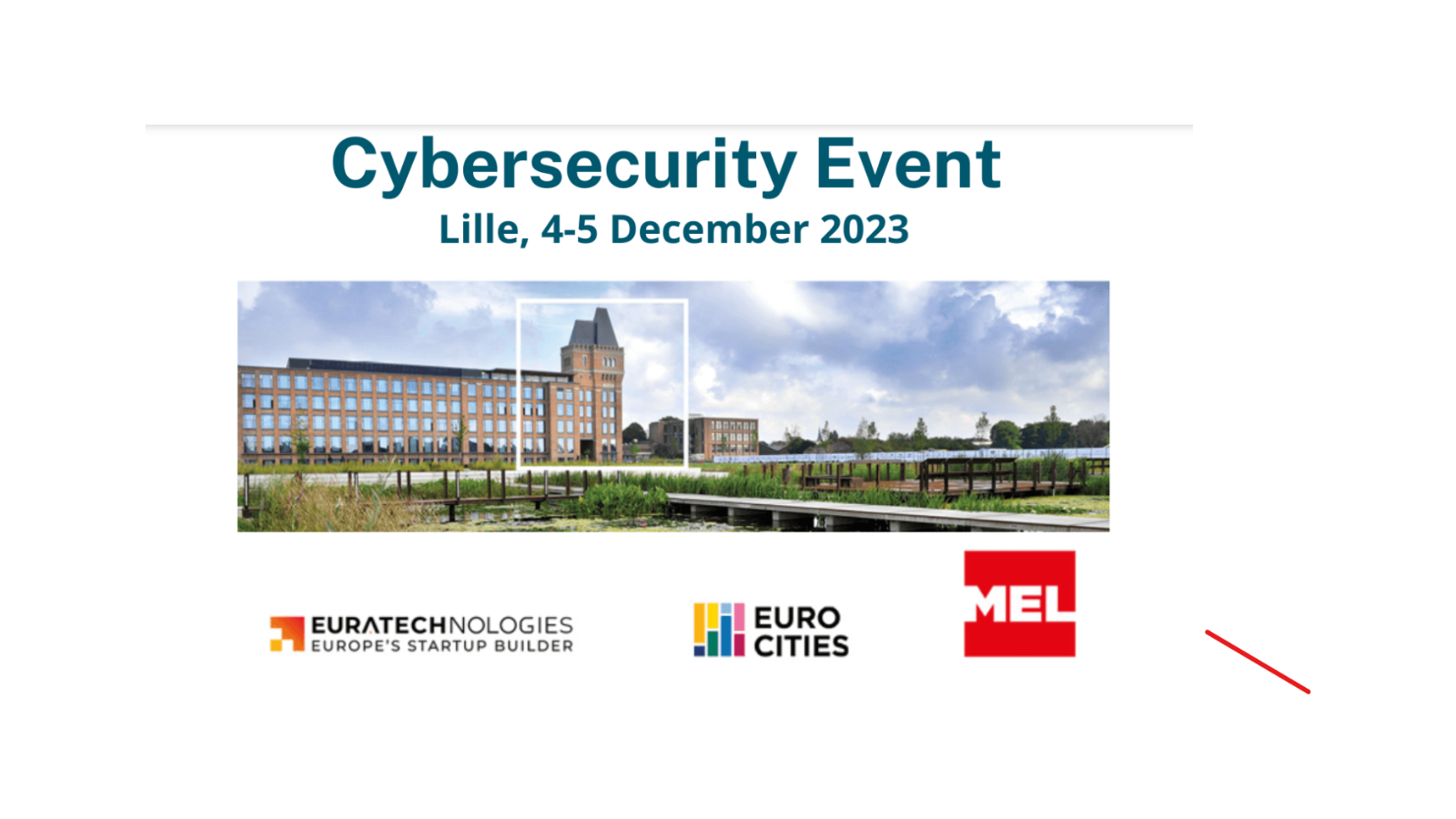
Cybersecurity event in Lille
Lille Metropole, along with Eurocities and EuraTechnologies, are organising an exclusive cybersecurity event on the 4 and 5 December in Lille. The event will be an opportunity to bring together various stakeholders, many of whom work for cities and regions, to discuss existing actions and strategies, as well as looking forward to future developments in the field.
Having already received the International Cybersecurity Forum (FIC) for several years and having recently inaugurated a Cybercampus, Lille Metropole is developing its reputation as a center of expertise and knowledge in the realm of cybersecurity throughout Europe.
More information and registration can be found here.
- 04/12/2023 - 12:00 - 05/12/2023 - 14:00
-
Lille Métropole
92 Boulevard des Cités Unies
59000 Lille
France - Romain Wascat
-
Member
-
Working Group
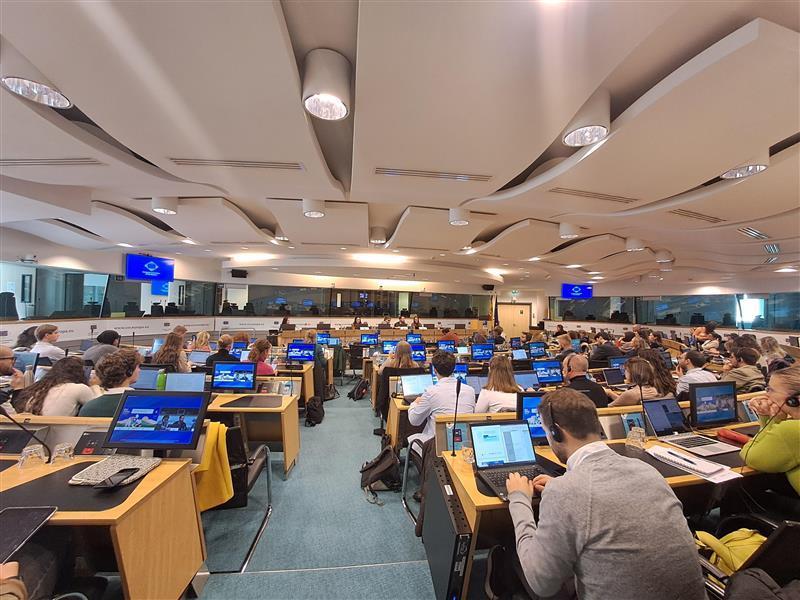
EU Soil Day - Addressing the regional dimension of soil health
The EU Soil Day, held last 6 November at the Committee of the Regions, represented a unique opportunity to address regional and local challenges in soil health. The event, organised by the Region of Murcia in partnership with ERRIN and the HuMUS project with the support of the Spanish EU Presidency, brought together regions, researchers, soil projects and soil enthusiasts to explore the territorial dimensions of soil health.
ERRIN moderated the session ‘Regional and local dimension supported by the EU Mission Soil to improve soil health’, in a dialogue with the Mission Soil secretariat on the crucial role that regional and local authorities play to make the implementation of the Mission successful.
During the session, the coordinator of the HuMUS project emphasised the importance of engaging all ecosystem actors in advancing on the local soil challenges and launched the cascade funding call that will support 20 regions and municipalities with a lump-sum to boost participatorygovernance methods and tools for soil quality and health governance in the territories involved.
The closing session was a unique opportunity for ERRIN members to present grassroots examples of inspiring governance models. Stakeholders from Cities Northern Netherlands (NL), Pomorskie (PL), Oslo Region European Office (NO), Flanders (BE), showed how farmers, researchers, citizens, cities and regional authorities, are joining forces to improve soil health in a collaborative approach.
ERRIN through its Bioeconomy WG will continue supporting the regions to successfully implement the Mission and boost the number of local stakeholders committed to a transition towards healthy soils. As from January 2024, ERRIN will speed up the implementation of the soil living labs and lighthouses contributing to the implementation of the Mission through its involvement in the SOILL Start-up project. Learn more about ERRIN involvement in the Mission Soil here.
To further engage with the Mission Soil Week, taking place next 21 – 23 November in Madrid, interested participants are encouraged to register to attend online through this link.
Additionally, cities and regions aiming to boost their local soil challenges through participatory approaches can apply to the HuMUS project cascade funding by 29 February 2024 here.
- Gianpiero Petruzziello
- 15/11/2023
-
Working Group
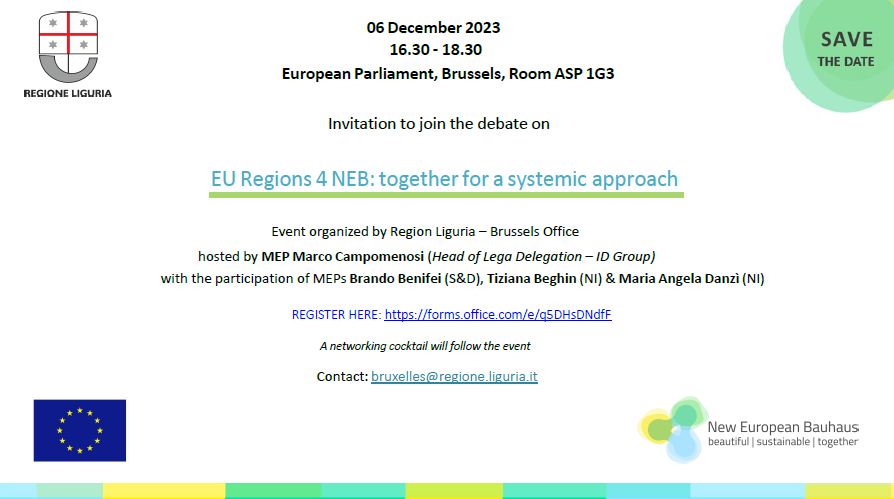
EU Regions 4 NEB: together for a systemic approach
The debate on EU regions 4 NEB: together for a systemic approach is organised by Region Liguria – Brussels Office, hosted by MEP Marco Campomenosi (Head of Lega Delegation – ID Group) with the participation of MEPs Brando Benifei (S&D), Tiziana Beghin (NI) & Maria Angela Danzì (NI). A networking cocktail will follow the event.
To attend the event, register by 22 November via this link.
- 06/12/2023 - 16:30 - 06/12/2023 - 18:30
-
European Parliament, Hall ASP1G3
Rue Wiertz 60
1047 Brussels
Belgium - Agnieszka Wieczorek Jetha
-
Working Group
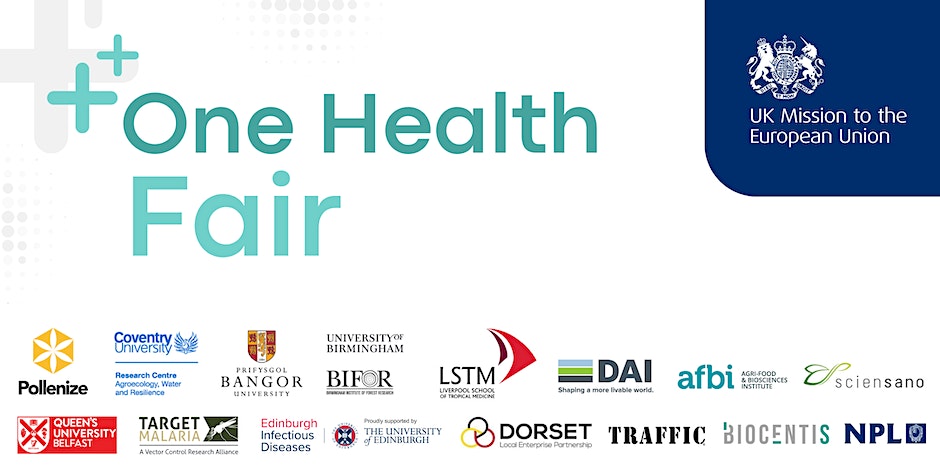
One Health Fair
The UK Mission to the EU invites you to an interactive One Health Fair in collaboration with over 15 expert partners including those representing UK member regions of ERRIN. The event will take place on 22 November from 17:00-21:00 at the British Residence, Rue Ducale 17, Brussels.
The event will showcase One Health solutions and science in an interactive reception: experience virtual realities, get competitive in our One Health games and leave your mark on what the future holds for One Health.
We will be exploring One Health as a concept that brings together cross-cutting work on animal, plant and human health including in relation to climate change.
Please register here.
- 22/11/2023 - 17:00 - 22/11/2023 - 21:00
-
British Residence
Rue Ducale 17
1000 Brussels
Belgium - Elaine Groom
-
Working Group

Regulatory Sandboxes in the Energy Sector - Call for examples
The Energy and Climate Working Group is looking for examples of the creation or the use of regulatory sandboxes in the energy sector, to be presented in an upcoming meeting on this topic. The meeting will take place on Tuesday 12 December between 14:00-15:30 CET at ERRIN office (Rue du Luxembourg 3, 1000 Brussels).
The meeting will include 2-3 examples of projects, activities or initiatives where regional and local authorities have used regulatory sandboxes. They are defined as schemes that allow the testing of innovations in a controlled real-world environment, under a specific plan developed and monitored by a competent authority. They are usually organised on a case-by-case basis, may involve a temporary loosening of applicable rules and include safeguards to preserve overarching regulatory objectives.
The aim is to jointly explore innovative solutions that can help local and regional governments set up sandboxes and understand why this tool can be potentially interesting for the implementation of energy-related policies.
The European Commission published a staff working document on the topic, using the energy sector as a concrete example. The document can be found here.
Please send your contribution to rodolphe.doite@errin.eu and silvia.ghiretti@errin.eu by Friday 24 November. The email should include a short description of the proposed example: a brief description of the project - highlighting its innovative aspect, the funding source and the stakeholders involved in the project.
The foreseen speaker should preferably be able to attend in person in Brussels, but online participation will be possible.
More information on the meeting and the registration will be available at a later stage.
- Rodolphe Doité
- 14 November 2023
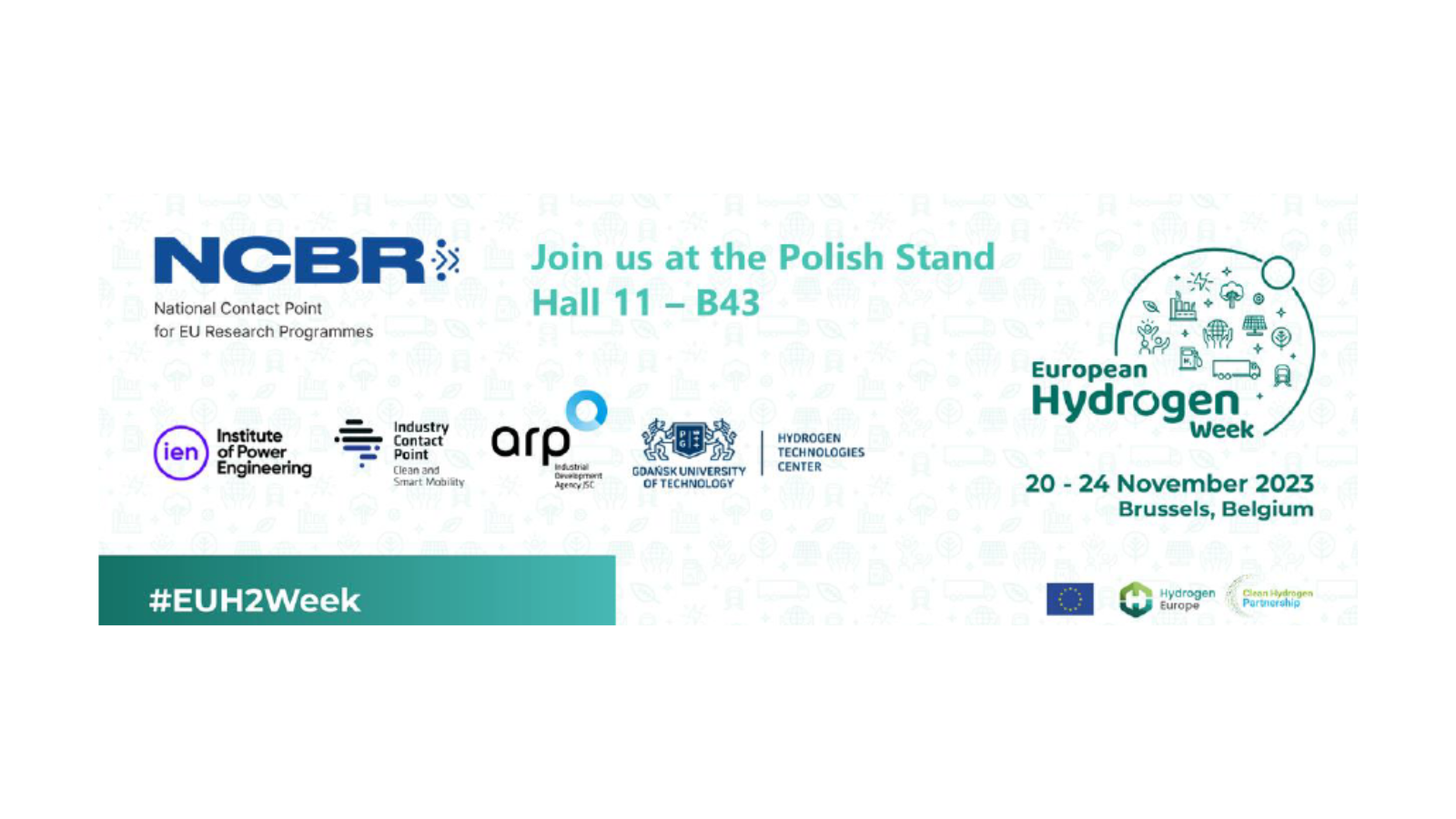
Polish H2 mixer for European Hydrogen Week
NCBR Office in Brussels, the Polish National Contact Point for Horizon Europe and Industry Contact Point for Clean & Smart Mobility, invites you to an informal networking event at our office in Brussels as part of European Hydrogen Week. The event will take place on 22 November from 18:00-21:00.
The European Hydrogen Week will attract to Brussels numerous and diverse players in the Polish R&I hydrogen ecosystem. You can meet and talk to them at the Polish National Contact Point for Horizon Europe: hall 11, stand B43.
You are invited to join us for relaxed conversation and a buffet dinner.
Please register here
- 22/11/2023 - 18:00 - 22/11/2023 - 21:00
-
NCBR Office Brussels – Business & Science Poland
Rue Belliard 40
5th floor
1040 Brussels
Belgium - Adrianna Frankowska
-
Working Group

Why do networks fail? And how can we reverse this process?
On a European level, facilitating collaboration using thriving consortia is one of the main ways impact is achieved. Join The Hague University of Applied Sciences on 11 December from 11:00-14:00 at the House of Dutch Provinces to discuss what makes networks thrive.
The European Union is based on networks. We are all part of different networks. But how do they function and why do they so often fail? Networks have proven to be one of the most efficient and effective forms for generating impact and all our interactions would ultimately lead to forming, (co)creating, (co)designing and (co)developing networks. However, what recent data shows is that only less than 10% of these networks are there to thrive.
On a European level, facilitating collaboration by means of thriving consortia is one of the main ways in which impact is achieved. Strong networks are a precondition for synergies in the European knowledge ecosystem and emerge in all pillars of the Horizon program, as well as the missions and the initiatives emerging from the New European Innovation Agenda. The Horizon Europe Strategic Plan 2025-2027 Analysis emphasises the need to translate research to societal impact by means of knowledge valorisation and value creation through multi-actor approaches, where networks play a pivotal role. In anticipation of the proposal for the next European Research Framework Program, we reflect on the factors that make networks a success.
During the event you can bring your network to the table as an example of a thriving or struggling network. And – if applicable – learn what is needed to make your network successful.
Please register here
- 11/12/2023 - 11:30 - 11/11/2023 - 14:00
-
Universities of Applied Sciences Netherlands
Huis van de Nederlandse Provincies
Rue de Treves 59-61, 4th floor
1040 Brussels
Belgium - Loes Rutten
-
Member
-
Working Group
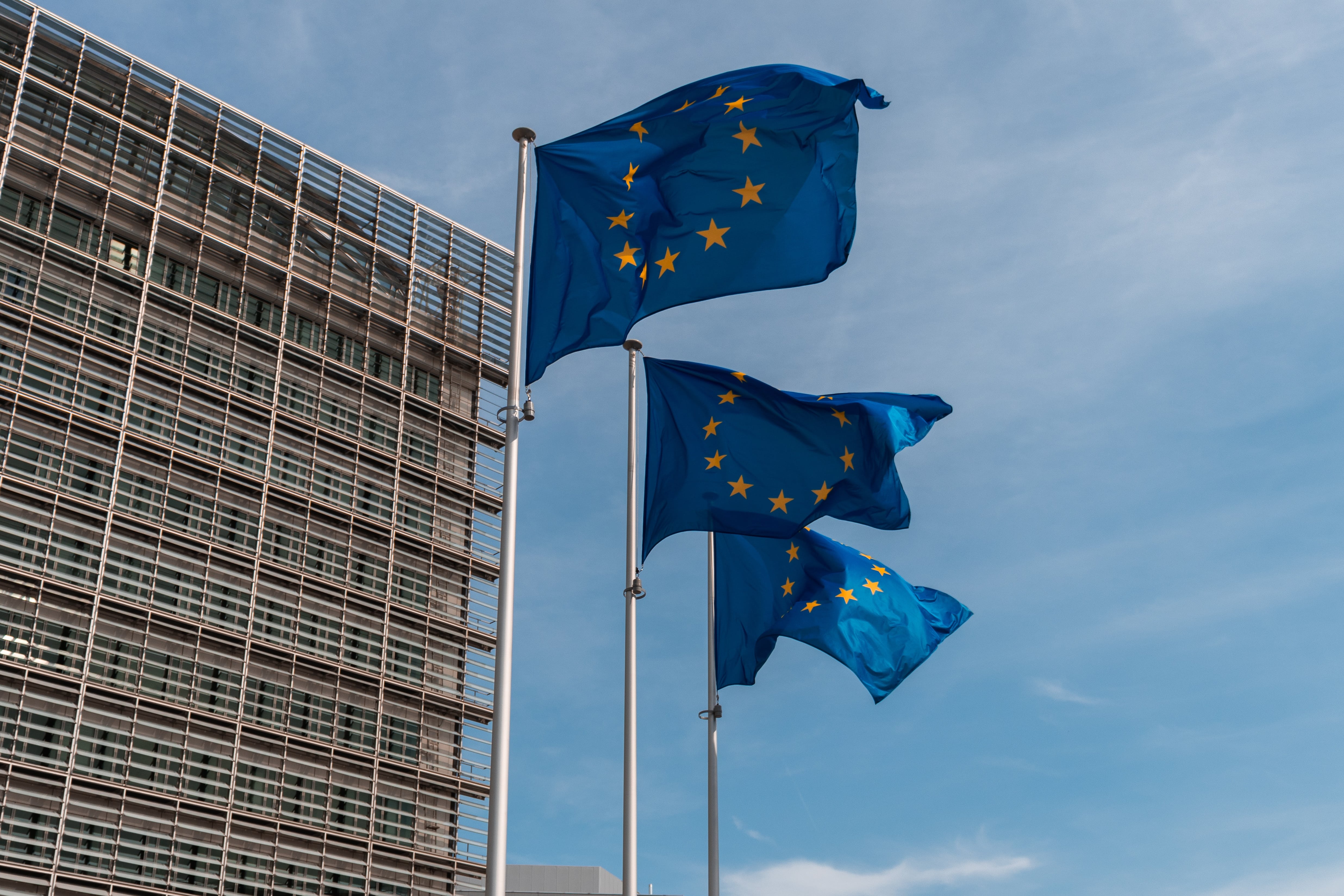
Policy WG meeting: ERA Hubs: Defining the concept
In November 2021, ERA Hubs initiative was introduced as Action 15 of the ERA Policy Agenda 2022-2024, with the aim to strengthen research and innovation ecosystems at national and regional level while looking both at multi-level governance and multi-stakeholder engagement. A call for proposals was subsequently organised under Horizon Europe programme between January and April 2022 to test and pilot the ERA Hubs concept with a limited number of ecosystems through implementation in countries and regions where knowledge ecosystem structures aligned to the ERA Hubs concept already exist, combined with countries or regions where an integrated place-based approach is missing. Two projects led by ERRIN member stakeholders were selected for funding from among 120 applicants and kicked off at the end of 2022: COOPERATE, guided by Eindhoven University of Technology, and ERA_FABRIC, coordinated by ART-ER Attractiveness Research Territory – Emilia-Romagna.
While the ERA Hubs action is currently on hold in the ERA Forum, this Policy WG meeting will offer a chance to explore the work done so far in the two piloting projects, gain insights into ongoing reflections, engage in interactive discussion and learn about upcoming opportunities for regions. ERRIN remains a strong advocate for ERA Hubs and their rollout, also as they could potentially serve as foundation and point of reference for supporting more thematic ecosystem approaches that gain increasing attention, such as Hydrogen Valleys or Renewable Energy Valleys. The event will take place in person at the ERRIN premises on 17 November from 10:30-12:00, with welcome coffee from 10:00.
Following up on the September Policy WG meeting on ERA Policy Agenda going forward, this event will also feature a reflection on the state of play of the preparations of the ERA Policy Agenda 2025-2027.
In order to attend the event, please register by pressing the “Register” button on this page. Please note that you need to be logged in to register, and that due to its character and limited room capacity, this meeting is not open for trainees.
You may find the agenda attached.
Thank you for attending this Policy WG meeting. You may find the presentations from the session on this page.
- 17/11/2023 - 10:30 - 17/11/2023 - 12:00
-
ERRIN
Rue du Luxembourg 3 (8th floor)
1000 Brussels
Belgium - Ewa Chomicz
-
Working Group
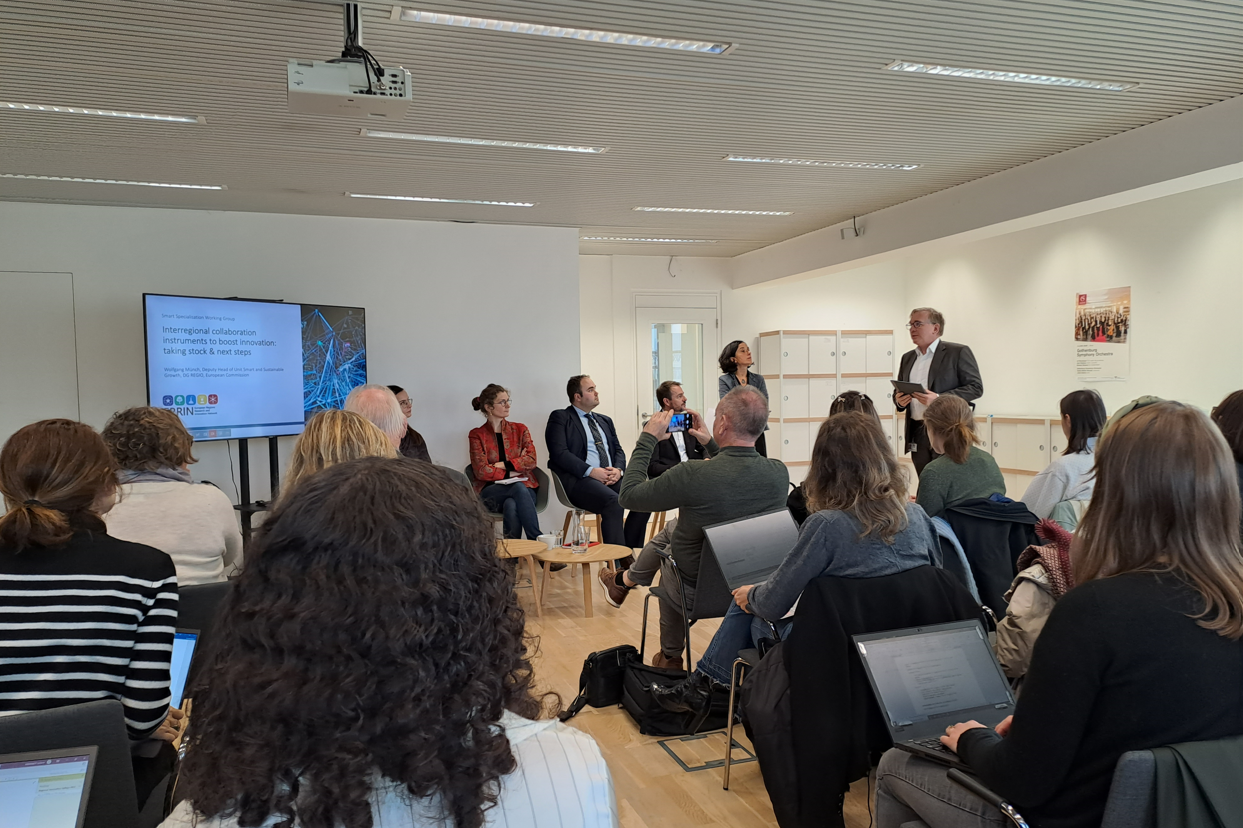
A look forward: Launching ERRIN reflections on regional dimension in R&I post-2027
Autumn 2023 marked the start of ERRIN’s targeted reflections on regional dimension in research and innovation in the new EU Multiannual Financial Framework post-2027, relating to the next EU Framework Programme for R&I (FP10) and future cohesion policy.
As part of its mission, ERRIN has been offering regular assessments and recommendations for the Horizon Europe programme and its elements through continuous dialogue with the Commission and through written messages e.g. for the Horizon 2014-2027 consultation in February 2023, WIDERA WP 2023-2024 in June 2022 or EU Missions WP 2023-2024. This ongoing work done in co-creation with members with the aim of improving regional perspective in R&I has also been a way for ERRIN to contribute to shaping the FP10 narrative from the beginning.
At the same time, to address the start of dedicated FP10 discussions at the EU level and with the Commission’s proposal on FP10 expected in mid-2025, in October 2023 Policy WG organised its first activity oriented specifically towards the new framework programme development. The event on “Looking ahead: Horizon 2025-2027, EU Missions and FP10” invited a representative of the Commission’s DG RTD Common Strategic Planning & Programming Service Unit to share the latest insights, timeline of the process and engage in discussion with network members. In the same month, ERRIN also offered input to the stakeholder consultation to the CoR opinion “Towards an integrated EU policy approach to support place-based innovation for the green and digital transition”, to be adopted in January 2024. Looking forward, the network will be actively following developments related to the upcoming CoR opinion on FP10, and the work of the Commission’s high-level expert group on FP10.
On the cohesion policy side, in September 2023 Smart Specialisation WG held an event on “R&I in cohesion policy post-2027”, featuring a dialogue with a representative of the Commission’s high-level group on the future of cohesion policy, and a JRC expert to the CoR President on the thematic CoR opinion. One month earlier, ERRIN also shared first reflections on the R&I dimension in the future cohesion policy as input to the CoR opinion scheduled for adoption at the end of November 2023. In the coming months, we will work on deepening the related exchanges within and outside the network.
While the planning processes for R&I and cohesion policies are taking place in parallel, one of the key ERRIN messages at this preparatory stage is the need to increase their alignment and exchanges to ensure coherence and closer links between the policies. The importance of place-based R&I ecosystems should be highlighted in FP10, while the R&I dimension should be strengthened in cohesion policy post-2027. These connections should be established where relevant, based on collaboration between different Directorates of the Commission and dialogue between EU, national and regional governments, thus also creating a sounder ground for enabling practical implementation of synergies between funding from respective programmes.
The critical importance of ensuring policy coherence can be seen for example when looking at the various interregional collaboration initiatives aiming to strengthen innovation ecosystems by aligning objectives of cohesion (via smart specialisation strategies) and R&I policies, such as Partnerships for Regional Innovation (PRI) and Regional Innovation Valleys (RIVs). Last week, Smart Specialisation WG held a meeting on “Interregional collaboration instruments to boost innovation: taking stock & next steps”, discussing the challenges and added value of the different initiatives based on the practical experiences of ERRIN members, and reflecting on their way forward together with a representative of the Commission’s DG REGIO.
ERRIN looks forward to continuing to support the processes of shaping the new R&I and cohesion policy frameworks post-2027 as they go ahead, based on the bottom-up involvement of members across the whole network.